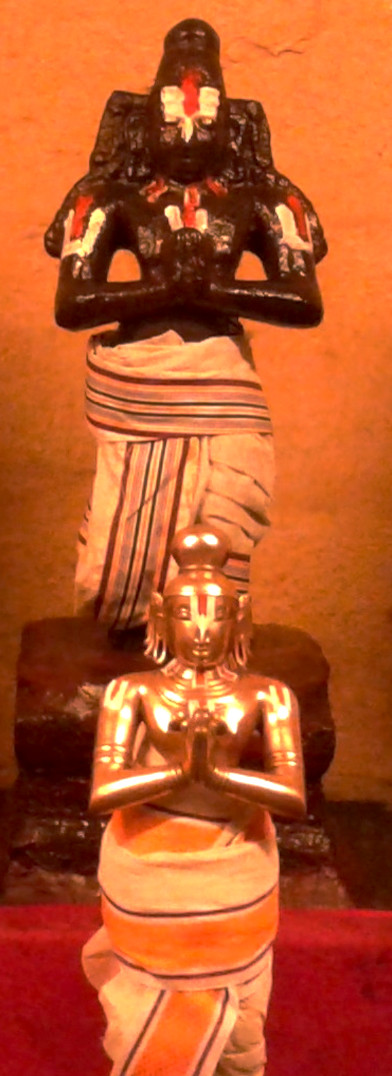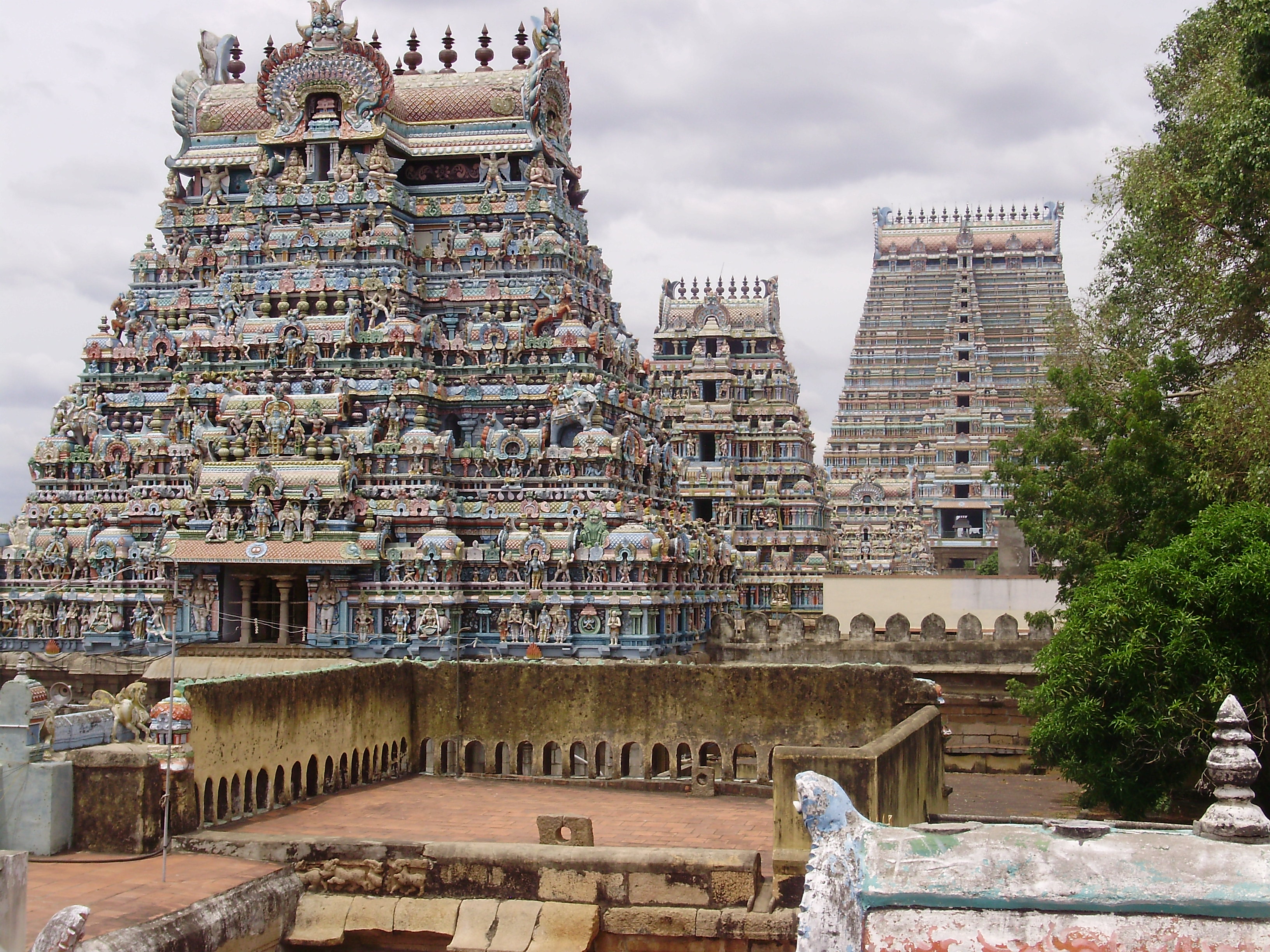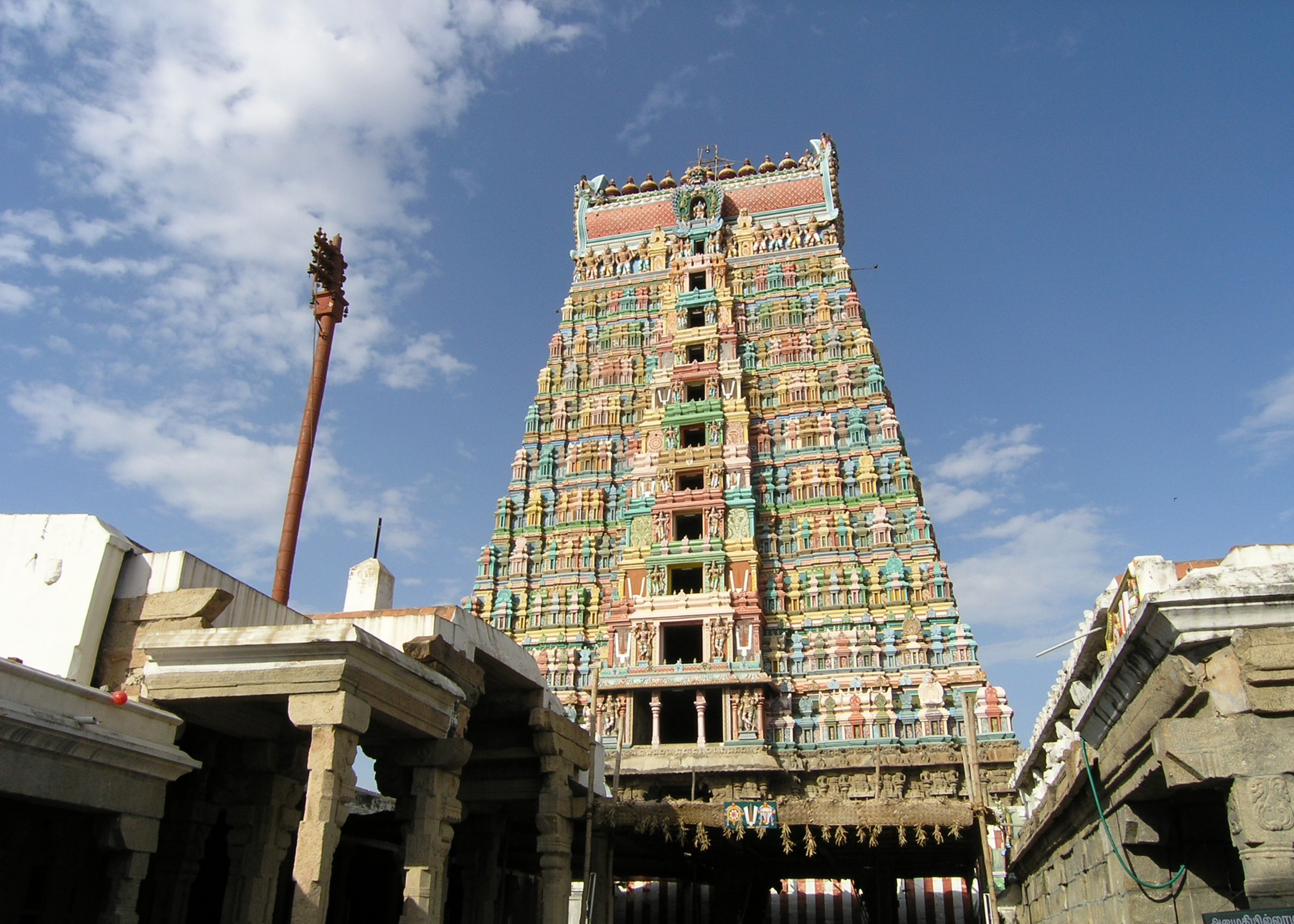|
Alvars
The Alvars ( ta, ஆழ்வார், Āḻvār, translit-std=ISO, lit=The Immersed) were the Tamil poet-saints of South India who espoused '' bhakti'' (devotion) to the Hindu preserver deity Vishnu, in their songs of longing, ecstasy, and service. They are venerated in Vaishnavism, which regards Vishnu as the Ultimate Reality. Many modern academics place the lifetime of the Alvars between the 5th century and 10th century CE. Traditionally, the Alvars are considered to have lived between and . Orthodoxy posits the number of Alvars as ten, though there are other references that include Andal and Madhurakavi Alvar, making the number 12. Andal is the only female Alvar among the 12. Together with the contemporary 63 Shaivite Nayanars, they are among the most important saints from Tamil Nadu. The devotional outpourings of the Alvars, composed during the early medieval period of Tamil history, were the catalysts behind the Bhakti Movement through their hymns of worship to ... [...More Info...] [...Related Items...] OR: [Wikipedia] [Google] [Baidu] |
Vaishnavism
Vaishnavism ( sa, वैष्णवसम्प्रदायः, Vaiṣṇavasampradāyaḥ) is one of the major Hindu denominations along with Shaivism, Shaktism, and Smartism. It is also called Vishnuism since it considers Vishnu as the sole supreme being leading all other Hindu deities, i.e. '' Mahavishnu''. Its followers are called Vaishnavites or ''Vaishnava''s (), and it includes sub-sects like Krishnaism and Ramaism, which consider Krishna and Rama as the supreme beings respectively. According to a 2010 estimate by Johnson and Grim, Vaishnavism is the largest Hindu sect, constituting about 641 million or 67.6% of Hindus. The ancient emergence of Vaishnavism is unclear, and broadly hypothesized as a fusion of various regional non-Vedic religions with Vishnu. A merger of several popular non-Vedic theistic traditions, particularly the Bhagavata cults of Vāsudeva-krishna and '' Gopala-Krishna'', and Narayana, developed in the 7th to 4th century BCE. It was in ... [...More Info...] [...Related Items...] OR: [Wikipedia] [Google] [Baidu] |
Thiruppaan Alvar
Tiruppan Alvar () was one of the twelve ''Alvars'' saints of South India, who were poet-saints known for their affiliation to the Vaishnava tradition of Hinduism. The verses of the ''Alvars'' are compiled as the ''Naalayira Divya Prabandham'' and the 108 temples revered are classified as ''divya desams''. Tiruppan Alvar is considered the eleventh in the line of the twelve Alvars. As per local traditions, he was born to a couple from the ''Panar'' community. Tiruppan Alvar is known for his affiliation to Ranganatha of the Srirangam Ranganathaswamy temple and is traditionally believed to have merged with the deity upon his demise. The ten verses of Tiruppan Alvar are called the '' Amalanadhipiran'', and his contributions amount to ten verses among the 4000 stanzas in the '' Naalayira Divya Prabandam''. The works of Tiruppan Alvar contributed to the philosophical and theological ideas of Vaishnavism. In South Indian Vishnu temples, Tiruppan Alvar has images and festivals associ ... [...More Info...] [...Related Items...] OR: [Wikipedia] [Google] [Baidu] |
Poigai Alvar
Poigai Alvar was one of the twelve ''Alvar'' saints of South India, who are known for their affiliation to Vaishnava tradition of Hinduism. The verses of ''Alvars'' are compiled as ''Nalayira Divya Prabandham'' and the 108 temples revered are classified as ''Divya Desam''. Poigai is one of the three principal ''Alvars'', with the other two being Bhoothath Alvar and Peyalvar, collectively called ''Mutalamalvargal,'' who are regarded to be born out of divinity. Poigai composed hundred verses that are classified as ''Mutal Tiruvantati,'' and his composition is set in the ''antati'' style, in which the ending syllable is the starting one for the next verse. According to traditional account, the first three ''Alvars'' belong to ''Dvapara Yuga'' (before 4200 BCE). As per Hindu legend, Poigai was found in a small pond near the Yadhotakaari temple at Tiruvekkaa. In Tamil, small pond is called ''poigai'', and since he was found in a pond, he got the name Poigai. As per legend, the thre ... [...More Info...] [...Related Items...] OR: [Wikipedia] [Google] [Baidu] |
Thondaradippodi Alvar
Thondaradippodi Alvar or Vipra Narayana was one of the twelve ''Alvar'' saints of South India, who are known for their affiliation to Vaishnava tradition of Hinduism. The verses of ''Alvars'' are compiled as ''Naalayira Divya Prabandham'' and the 108 temples revered are classified as ''Divya desam''. Thondaripodi is considered the tenth in the line of the twelve Alvars. As per Hindu legend, he was born as Vipra Narayana and got devoted to Ranganatha of the Srirangam Ranganathaswamy temple. Since he worshipped even the dust from the devotees of Ranganatha, he attained the name Thondaradipodi. His works are the '' Tiruppallieluchi'' having ten verses, and Tirumālai having forty verses, both of which are counted among the 4000 stanzas in the ''Naalayira Divya Prabandam''. The works of Thondaradipodi and other Alvars contributed to the philosophical and theological ideas of Vaishnavism. Along with the three Saiva nayanmars, they influenced the ruling Pallava kings of the South ... [...More Info...] [...Related Items...] OR: [Wikipedia] [Google] [Baidu] |
Periyalvar
Periyalvar (), also known as Vishnuchittar, was one of the twelve '' Alvar'' saints of South India who are known for their affiliation to the Vaishnava tradition of Hinduism. He was the foster father of Andal. Andal, also called as Kodhai, is the only female Alvar, and is considered to be the incarnation of Bhudevi according to Sri Vaishnavism. The verses of '' Alvars'' are compiled as the ''Naalayira Divya Prabandham'' and the 108 temples revered are classified as '' Divya Desam''. According to some accounts, Periyalvar is considered the first in the line of the twelve Alvars, while other accounts place him as the eighth. His original name was Vishnuchittar. Since he blessed Vishnu as though assuming he were an elder to the deity, he is called Periyalvar. According to Hindu legend, Periyalvar was the foster father of Andal, the only female Alvar. The works of Periyalvar contributed to the philosophical and theological ideas of Vaishnavism, the proponent behind the Bhakti ... [...More Info...] [...Related Items...] OR: [Wikipedia] [Google] [Baidu] |
Nammalvar
Nammalvar (Tamil: நம்மாழ்வார், lit. 'Our Alvar') was one of the twelve Alvar saints of Tamil Nadu, India, who are known for their affiliation to the Vaishnava tradition of Hinduism. The verses of the Alvars are compiled as the Naalayira Divya Prabandham, where praises are sung of 108 temples that are classified as divine realms, called the Divya Desams. Nammalvar is considered to be the fifth in the line of the twelve Alvars. He was born in a Shudra family, but his pursuit of knowledge accorded him the respect of a Brahmin. He is highly regarded as a great mystic of the Vaishnava tradition. He is also considered to be the foremost among the twelve Alvars, and his contributions amount to 1352 among the 4000 stanzas in the ''Naalayira Divya Prabandam''. According to traditional scriptures, Nammalvar was born in 3059 BCE in Alwarthirunagiri; historically he flourished in 8th century CE. In Hindu legends, Nammalvar remained speechless from the moment of his ... [...More Info...] [...Related Items...] OR: [Wikipedia] [Google] [Baidu] |
Sri Vaishnavism
Sri Vaishnavism, or the Sri Vaishnava Sampradaya, is a denomination within the Vaishnavism tradition of Hinduism. The name refers to goddess Lakshmi (also known as Sri), as well as a prefix that means "sacred, revered", and the god Vishnu, who are together revered in this tradition. The tradition traces its roots to the ancient Vedas and Pancharatra texts, popularised by the Alvars and their canon, the Naalayira Divya Prabandham. The founding of Sri Vaishnavism is traditionally attributed to Nathamuni of the 10th century CE; its central philosopher has been Ramanuja of the 11th century, who developed the ''Vishishtadvaita'' ("qualified non-dualism") Vedanta sub-school of Hindu philosophy. The tradition split into two denominations around the 16th century. The Vadakalai sect vested the Vedas with the greatest authority and follow the doctrine of Sri Vedanta Desika, whereas the Tenkalai sect vested the Naalayira Divya Prabandham with the greatest authority and follow the princi ... [...More Info...] [...Related Items...] OR: [Wikipedia] [Google] [Baidu] |
Madhurakavi Alvar
Madhurakavi Alvar was one of the twelve ''Alvars'' saints of South India, who are known for their affiliation to Vaishnava tradition of Hinduism. The verses of the ''Alvars'' are compiled as the ''Naalayira Divya Prabandham'' and the 108 temples revered are classified as '' Divya Desams''. Madhurakavi is considered to be the sixth in the line of the twelve Alvars. He was the disciple of Nammalvar, considered to be the greatest among the twelve Alvars, his contributions amounting to 11 among the 4000 stanzas in the ''Naalayira Divya Prabandam''. Madhurakavi is believed to have recorded and compiled the works of Nammalvar, the ''Tiruvaymoli'' (1102 verses). The 11 verses of '' Kanninun Cirutampu'' composed by Madhurakavi Alvar may be considered to be the inspiration for the 4000 verses of ''Naalayira Divya Prabandham''. These verses were chanted by Nathamuni 12,000 times to propitiate Nammalvar and re-obtain the lost Naalayira Divya Prabandham from Nammalvar. As per Hindu legen ... [...More Info...] [...Related Items...] OR: [Wikipedia] [Google] [Baidu] |
Divya Desam
A Divya Desam or Vaishnava Divya Desam is one of the 108 Vishnu and Lakshmi temples that is mentioned in the works of the Alvars, the poet-saints of the Sri Vaishnava tradition. Of the 108 temples, 105 are in India, one is in Nepal, and the last two are believed to outside the earth, in Tirupparkatal and Vaikuntham. In India, they are spread over the states of Tamil Nadu (84), Kerala (11), Andhra Pradesh (2), Gujarat (1), Uttar Pradesh (4), and Uttarakhand (3). Muktinath, Saligramam is the only Divya Desam in Nepal. The Divya Desams are revered by the 12 Alvars in the ''Naalayira Divya Prabandham'', a collection of 4,000 Tamil verses. The Divya Desams follow either Tenkalai or Vadakalai modes of worship. Etymology In Sanskrit, ''divya'' means "divine" and ''desam'' indicates "realm" (temple). Geography Divya Desams are classified into six regions: #Chera Nadu # Chola Nadu # Pandya Nadu # Pallava Nadu # Vada Nadu # Vinnulaga Divya Desams Alvars and Divya Prabandham The wor ... [...More Info...] [...Related Items...] OR: [Wikipedia] [Google] [Baidu] |
Divya Prabandha
The Naalayira Divya Prabandham ( ta, நாலாயிரத் திவ்வியப் பிரபந்தம், lit=Four Thousand Divine Hymns, translit=Nālāyira Divya Prabandham) is a collection of 4,000 Tamil verses composed by the 12 Alvars. It was compiled in its present form by Nathamuni during the 9th–10th centuries. The work, an important liturgical compilation of the Tamil Alvars, marks the beginning of the canonisation of 12 ''Vaishnava'' poet saints, and these hymns are still sung extensively today. The works were lost before they were collected and organised in the form of an anthology by Nathamuni. Description The ''Divya Prabandham'' sings the praises of Narayana (Vishnu) and his many forms. The Alvars sang these songs at various sacred shrines known as the Divya Desams. The Tamil ''Vaishnavites'' are also known as ''Ubhaya Vedanti'' (those that follow both Vedas, that is, the Sanskrit Rigveda, Yajurveda, Samaveda, and Atharvaveda, as well as the ... [...More Info...] [...Related Items...] OR: [Wikipedia] [Google] [Baidu] |
Naalayira Divya Prabandham
The Naalayira Divya Prabandham ( ta, நாலாயிரத் திவ்வியப் பிரபந்தம், lit=Four Thousand Divine Hymns, translit=Nālāyira Divya Prabandham) is a collection of 4,000 Tamil verses composed by the 12 Alvars. It was compiled in its present form by Nathamuni during the 9th–10th centuries. The work, an important liturgical compilation of the Tamil Alvars, marks the beginning of the canonisation of 12 ''Vaishnava'' poet saints, and these hymns are still sung extensively today. The works were lost before they were collected and organised in the form of an anthology by Nathamuni. Description The ''Divya Prabandham'' sings the praises of Narayana ( Vishnu) and his many forms. The Alvars sang these songs at various sacred shrines known as the Divya Desams. The Tamil '' Vaishnavites'' are also known as ''Ubhaya Vedanti'' (those that follow both Vedas, that is, the Sanskrit Rigveda, Yajurveda, Samaveda, and Atharvaveda, as well a ... [...More Info...] [...Related Items...] OR: [Wikipedia] [Google] [Baidu] |
Thirumangai Alvar
Thirumangai Alvar (IAST: ), also referred to as Thirumangai Mannan is the last of the 12 Alvar saints of south India, who are known for their affiliation to the Vaishnava tradition of Hinduism. He is considered one of the most learned Alvars, and the most superior Alvar in the context of composition of verses. Pillai 1994, pp. 192–4 He holds the title ''Narkavi Perumal'', the mark of an excellent poet, and ''Parakala'' (Beyond Time). Though he is respected as a Vaishnava saint-poet, he initially worked as a military commander, a chieftain, and then a robber. After his conversion to Vaishnavism, he confronted practitioners the sect of Shaivism, as well as Buddhism and Jainism. Dating and hagiography The traditional date attributed to Thirumangai is year 399 of ''Kali Yuga'', that is 2702 or 2706 BCE, making him traditionally the last of the Alvar saints.Chari 1997, p. 10 Modern scholars have placed the Alvars in between 5th to 9th centuries based on few historical evidence ... [...More Info...] [...Related Items...] OR: [Wikipedia] [Google] [Baidu] |
.jpg)

.jpg)







